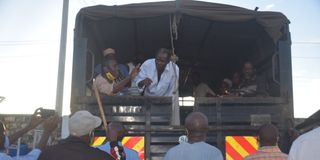Why government wants MRC members to surrender

Some of the alleged MRC suspects nabbed in Likoni, Mombasa county on April 30, 2021.
Security agencies want members of the Mombasa Republican Council (MRC) to surrender as the National Cohesion and Integration Commission (NCIC) seeks a dialogue with the separatist group to maintain peace.
The Mombasa security committee has urged holdouts of the group to surrender.
The committee, led by Mombasa County Commissioner Gilbert Kitiyo said MRC had been successfully suppressed.
Though the group began regrouping earlier this year, he said, it was eventually crushed.
“Years ago, there were many groups that were threatening peace and coexistence of Mombasa residents. However, they were crushed,” he said.
“We want remnants of MRC to surrender so that we can have a peaceful election. We must collaborate to deal with criminal outfits,” said Mr Kitiyo.
But NCIC said the emergence of criminal gangs is a threat to peace and security.
The commission wants a dialogue with MRC members on maintaining peace ahead of the 2022 elections.
“We are aware that in Mombasa gangs are sometimes used to cause violence. Youth are used to threaten people against voting or support a particular party or people,” said commissioner Dorcas Kedogo, who spoke at Sentrim Castle Royal Hotel in Mombasa.
She urged young people to maintain peace and refuse to be used by politicians to cause violence.
“We want to ensure peaceful elections. We are in Mombasa to sensitise Kenyans on peaceful coexistence,” she said during training on hate speech, ethnic-based political violence and peaceful coexistence targeting chiefs, Nyumba Kumi members and security peace committees from Mvita, Likoni, Changamwe, Jomvu and Nyali Sub-Counties.
She warned artistes against singing songs that incite the masses. NCIC has mapped out hotspot areas in Mombasa ahead of next year’s polls. But Mr Kitiyo, the county commissioner, said security agencies had been sensitised on peace.
MRC was formed in the 1990s to agitate for self-rule in what its leaders said in a past interview was to liberate Coast people from marginalisation and mistreatment by successive governments.
The militant group had been fighting for the Coast region to secede from Kenya with the slogan “Pwani si Kenya” though the outfit was outlawed alongside more than 30 other entities in a gazette notice in 2010.
But in 2012, a court held that declaring MRC a proscribed group was unlawful.
High Court Judge Francis Tuiyot urged the group to register as a political party so as to pursue its agenda through legal means. But the ruling was met with mixed reactions among Kenyans, with some Coast leaders opposing the ruling.
But MRC expressed satisfaction with the judge’s decision.
In 2012, President Mwai Kibaki rejected demands from the group to start negotiations.
That year, four people, including the bodyguard of the Fisheries minister at the time, Amason Kingi, were killed when suspected members of the group attacked his meeting in Mtwapa, Kilifi County.
The bodyguard, Harrison Maitha, died while protecting the minister from the machete-wielding attackers.
Later, Mr Kingi, now Kilifi governor, cautioned young people against being lured into joining the outfit.
At the height of the 2013 General Election campaigns, the group was linked to the killings of at least 14 people in the Coast region, including police officers during raids. MRC warned Coast inhabitants against participating in the polls.
Two members of the group were arrested in connection with the killings of four police officers in Jomvu on the eve of the polls.
The suspects were arrested in connection with a raid that left the officers dead, including Senior Superintendent of Police Otieno Owuori, Corporal Salim Chebii and police constables Stephen Maithya and Andrew Songwa.
A group of more than 100 youths descended on the officers with machetes shortly after the latter’s firearms ran out of bullets during a fierce gun exchange with the group that lasted more than 30 minutes.
Prosecutors told the court the brutal attack on the officers by the group was meant to deter residents from voting as it was planned on the eve of the 2013 polls.
The militants were also linked to clashes in Chumani during the 2013 elections, where they attacked police officers, killing one and stealing their rifles.
Previous government reports indicated that dozens of young people in the region had been enlisted by Al-Shabaab and MRC.
But in 2012 MRC spokesperson Omar Mwamnwadzi denied that the group was involved in any bloodshed, describing members as peaceful.
In 2014, about 15 suspected members of the group attempted to attack the heavily fortified Nyali Barracks.
Six of them were killed in the dawn attack on the KDF barracks. Another gang attempted another attack on an AP camp in Malindi but they were repulsed.
In 2016, two suspected members of the group were sentenced to death after being found guilty of murdering four police officers.
Justice Martin Muya said he was satisfied that prosecutors had proved their case against Jabir Ali Dzuya and Bwanamkuu Alwan.
MRC said its members were fighting for jobs and their land.
In the past, the group leaders said they wanted to secede because of a 50-year lease agreement signed by Kenyan Prime Minister Jomo Kenyatta and his Zanzibar counterpart Mohamed Shante under which the Coastal strip was integrated into Kenya. The group said the lease expired and they wanted to self-rule.
NCIC said it had begun implementing a road map to peaceful elections and is identifying and seeking to stop triggers of election-related violence.





